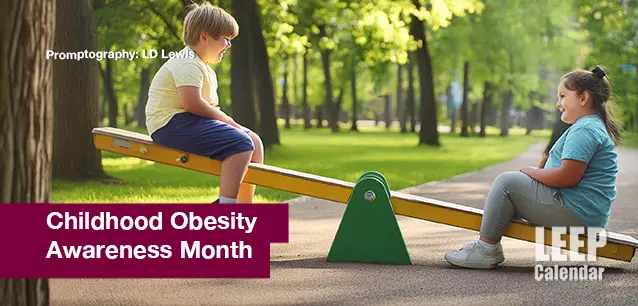 AD
AD
Today is: July 26
Scroll to explore events active on this date.
LEEP INK FEATURES

May Blooms: Events in May 2025
Along with October, May is one of the most densely packed months of the year. It's before the summer humidity and the last whole month of the school year. The weather is warming in t...

Sweet June 2025
The solstice on the 20th marks the onset of summer (Northern Hemisphere) or winter (Southern Hemisphere). Many people, particularly in Europe, North America and Asia, will be embarking o...

Events in April 2025
Spring has sprung in the north, and the first hints of Autumn are on the horizon in the south. April is the month spring (or fall) gets underway, and it is filled with religious celebrations, including the Mu...
About Childhood Obesity Awareness Month
Family & Friends , United States
Ends: Sep 30, 2024
DESCRIPTION:
CHILDHOOD OBESITY AWARENESS MONTH: ADDRESSING A GROWING HEALTH CRISIS
Every September, the United States observes Childhood Obesity Awareness Month, an initiative to bring attention to the childhood obesity epidemic and promote healthier lifestyles for children. Organizations including the American Heart Association, the Centers for Disease Control and Prevention (CDC), and the U.S. Department of Health and Human Services spearhead this observance.
THE RISE IN CHILDHOOD OBESITY OVER THE PAST FIVE YEARS
Over the past five decades, the prevalence of childhood obesity has more than tripled in the United States. In the 1970s, approximately 5% of children aged 2 to 19 were considered obese. That number has risen to around 19%, affecting about 14.7 million children and adolescents. This alarming increase is attributed to various factors, including changes in diet, physical activity levels, and environmental influences.
TOP FIVE CAUSES OF OBESITY IN CHILDREN
Poor Diet—The consumption of high-calorie, low-nutrient foods such as sugary drinks, fast food, and snacks contributes significantly to weight gain in children.
Lack of Physical Activity—Increased screen time and sedentary lifestyles have reduced the amount of physical exercise children engage in, leading to weight gain.
Genetics—Family history and genetics can predispose children to obesity, influencing their metabolism and fat storage.
Environmental Factors—Limited access to healthy foods and safe places for physical activity, particularly in low-income neighborhoods, can increase the risk of obesity.
Psychological Factors—Stress, depression, and anxiety can lead to overeating or unhealthy eating habits in children.
THE IMPORTANCE OF ELIMINATING CHILDHOOD OBESITY
Addressing childhood obesity is crucial for several reasons. Obesity in children is associated with a higher risk of developing chronic health conditions such as type 2 diabetes, hypertension, heart disease, and certain cancers. Additionally, obese children are more likely to experience social and psychological issues, including bullying, low self-esteem, and depression. By tackling obesity early, we can improve children's overall health, quality of life, and long-term well-being.
HOW CAN AN OBESE CHILD SLIM DOWN?
Balanced Diet—Encourage a balanced diet rich in fruits, vegetables, whole grains, and lean proteins. Limit sugary drinks and high-calorie, low-nutrient foods.
Regular Physical Activity—Children should engage in at least 60 minutes of moderate to vigorous physical activity daily. Activities can include sports, dancing, biking, or simply playing outside.
Healthy Habits—Promote healthy eating habits, such as eating regular meals together as a family and avoiding distractions like TV during meals.
Education and Support—Educate children and their families about nutrition and the importance of physical activity. Support from healthcare providers, nutritionists, and community programs can be beneficial.
Behavioral Changes—Address any psychological factors contributing to obesity. Counseling and support groups can help children develop healthier relationships with food and physical activity.
Childhood Obesity Awareness Month reminds us of the critical need to address this public health issue. Through education, community efforts, and policy changes, we can create environments that support healthy growth and development for all children, ensuring a healthier future for the next generation.
VIDEOS
SUPPORTING DOCUMENTS
Currently, this event does not have supporting documents.
ADDITIONAL IMAGES
Currently, this event does not have supporting images.
Where would you like to go now?
 AD
AD


/footer-logo.svg)
